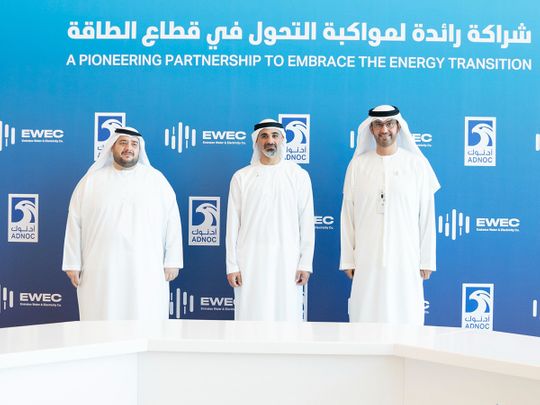
Dubai: The Abu Dhabi National Oil Company (ADNOC) struck a deal with Emirates Water and Electricity Company (EWEC) to meet its power requirements from clean energy sources.
The strategic partnership will see up to 100 per cent of ADNOC’s grid power supplied by EWEC’s nuclear and solar energy sources. This makes ADNOC the first major oil and gas company to decarbonise its power at scale through a clean power agreement and strengthening the company’s position as one of the world’s least carbon-intensive oil and gas producers.
Meanwhile, EWEC will benefit from long-term electricity offtake for its current and future renewable and clean power sources. These include solar and nuclear power, enabling continued investment in transformative innovations to decarbonise the energy sector.
The initiative was launched by Sheikh Khaled bin Mohamed bin Zayed Al Nahyan, Member of the Abu Dhabi Executive Council, Chairman of the Abu Dhabi Executive Office and Chairman of the Executive Committee of ADNOC’s Board of Directors.
"This partnership highlights ADNOC’s vital role in investing in transformative innovations, advancing decarbonisation efforts, and supporting the diversification of the UAE's energy portfolio," said Sheikh Khaled bin Mohamed. "It also marks a major moment in the activation of a strategic, long term plan to further decarbonise ADNOC’s operations sustainably."
Dr Sultan bin Ahmed Al Jaber, Minister of Industry and Advanced Technology and Managing Director and Group CEO of ADNOC, said, "ADNOC is committed to responsibly providing the world’s energy needs. We focus on decarbonising our operations, lowering our carbon intensity and strengthening our environmental stewardship and economic performance, in line with the Paris Climate Accords and our energy transition strategy."

As we embrace the energy transition and prepare for COP26, ADNOC extends an open invitation to new and existing partners to join us in delivering practical solutions to secure a cleaner energy future.
The clean energy partnership reinforces ADNOC’s role as a leading global supplier of lower-carbon oil and gas products and builds on its legacy of responsible hydrocarbon production. Murban, ADNOC’s flagship crude grade, already has a carbon intensity that is less than half the industry average, a figure that will be further improved as a result of this agreement.
Murban was made more accessible to global market participants following the start of trading of the Murban Futures Contract on ICE Futures Abu Dhabi earlier this year, and is well-positioned as the lowest carbon crude oil of choice for countries and refiners seeking to lower the carbon intensity of their hydrocarbon products.
On the refined products side, the new partnership will further reduce the carbon intensity of ADNOC products. For example, ADNOC is a large producer of aviation fuel, which is sold to customers both locally and globally. The new clean energy agreement will lower the carbon intensity of ADNOC’s aviation fuel, positioning it as one of the lowest carbon intensity Jet-A1 fuels available and an important enabler of ongoing de-carbonisation efforts in the aviation sector.
EWEC gets busy
In addition to developing world-leading solar power projects, EWEC is supporting the integration of the Barakah Nuclear Energy Plant into the Abu Dhabi grid. Once all four nuclear reactors are fully operational, the Barakah Plant will prevent the release of up to 21 million tonnes of carbon emissions every year, leading to the biggest decarbonisation efforts in the region.
The new clean energy partnership will accelerate ADNOC’s sustainability goal of decreasing its greenhouse gas (GHG) emissions intensity by 25 per cent by 2030 and offers the potential for additional value and operational efficiencies.








